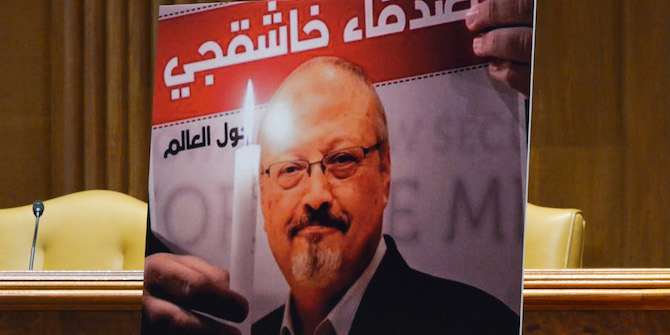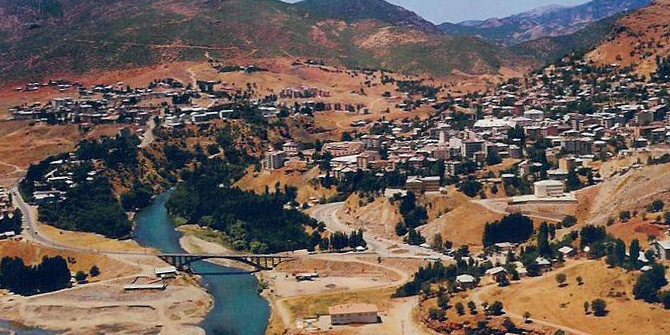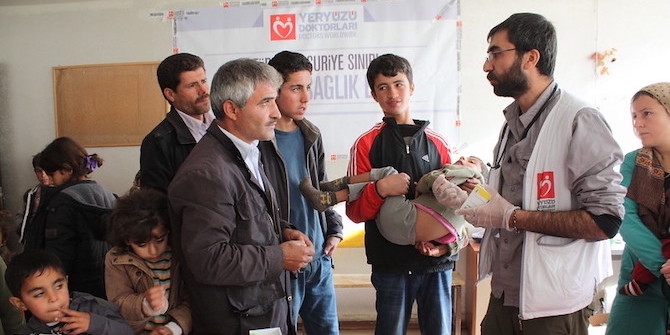by Spyros A. Sofos

On May 14 Turkish citizens will vote to decide whether the Turkish Republic will continue to reimagine itself in the image largely authored by Recep Tayyip Erdoğan and his Justice and Development Party (AKP) over the past two decades or whether it will follow a different path. The dilemma presented in the polls revolves around the juxtaposition of antagonistic, plebiscitary, majoritarian and authoritarian understandings of ‘democracy’, on the one hand, and a vision of a politics premised on diversity, dialogue and respect on the other.
The first has been explicitly favoured by the AKP leadership during the past fifteen years. After initially supporting the country’s fragile parliamentary system, the AKP slid rapidly towards adopting a personalised presidential leadership model free of the mediation of parliamentary ‘niceties’, as shown in Erdoğan’s appeals to the abstract National Will of the people to contest supreme court decisions. Erdoğan often prioritised the rights of the nation/people as a hard-to-define collectivity over those of individual citizens and the ‘selfish interests’ of social minorities whose representation was detrimental to the ‘unity and brotherhood’ of ‘the people’. When the AKP briefly lost its parliamentary majority in 2015, Erdoğan dismissed the possibility of a coalition government by expressing a preference for majoritarian politics and praising its effectiveness.
This aversion towards respect for diversity has been at the core of a centralised presidential system and authoritarian approach whereby expressions of dissent such as the 2013 Gezi protests, or the Academics for Peace initiative were criminalised and violently suppressed. The AKP presided over the persecution and imprisonment of the leftist, pro-Kurdish Democratic Peoples’ Party (HDP) leadership and cadres, a civil society crackdown, mass purges after the 2016 coup d’état, and a state of war against Turkey’s Kurdish citizens after the collapse of the Kurdish peace process.
Glimpses of an alternative, more pluralistic vision, have been discernible in the case of ‘democratic enclaves’ such as the Istanbul Metropolitan Municipality (İBB), as Öktem suggests in his study of the discourse and governance of İBB under Istanbul Mayor Ekrem İmamoğlu. More recently, a similar approach to democracy has been visible in the discourse of main presidential challenger and leader of the Republican People’s Party (CHP), Kemal Kiliçdaroğlu who – setting aside his party’s past repressive and authoritarian leanings and distrust towards minorities – has extended his solidarity towards Turkey’s Kurdish citizens and indicated that his vision of Turkey will be one of openness to difference.
Polls suggest a close contest with Kılıçdaroğlu and Erdoğan commanding a 46% and 43% share of the vote respectively. Having said that, the AKP has a record of interfering in elections. In 2022, with its coalition partner, the Nationalist Action Party (MHP), it introduced reforms with regard to the selection of Supreme Election Council (YSK) judges. YSK was also implicated in a court case against until recently aspiring presidential candidate İmamoğlu for insulting public officials that led to a prison sentence and a ban from political activity. An ongoing court case against left-leaning and pro-Kurdish HDP is ongoing with the party facing closure and its politicians a five-year ban. In October 2022, the so-called ‘censorship law’ was passed to criminalise ‘misinformation’ (effectively criticism of the government), and establishing tight control over online news websites in an information landscape where all major media are already controlled by the AKP.
But, apart from the AKP littering the path to the presidency with procedural obstacles, other factors need to be considered to make sense of, not only the current political landscape, but also the one after the election. The opposition, a motley alliance of parties unified in their will to put an end to Erdoğan’s era, has managed to agree on some vague policy directions but lacks a coherent positive vision extending beyond reversing Erdoğan’s policies. Kılıçdaroğlu has been trying (some say, rather late in the race) to compensate for this vision deficit through a series of ‘visionary’ YouTube and in-person speeches about the Turkey he envisages but, his is not a vision his coalition subscribes to. His CHP is itself divided, historically guided by a vision of a unitary Turkey where Kurdish activism represents a threat. Party supporters were more inclined to opt for backing charismatic İmamoğlu whose appreciation of Turkey’s diversity is complemented by a more personalistic leadership and populist style at a time when the Republic’s institutions are in dire need of reinvigoration and relevance. İYİ (the second largest coalition party) leader Meral Akşener, more positively predisposed towards İmamoğlu’s personalistic style, hesitated endorsing Kılıçdaroğlu’s candidacy and has expressed her party’s reservations for an opening to the country’s Kurdish population. İYİ, an offshoot of ultranationalist MHP, represents for some a more civilized version of the atavistic nationalism of its parent and has been implicated in xenophobic, anti-minority intimidation.
And then, across the political divide, there is AKP, a party effective in constructing an atmosphere of crisis and injustice frames, consistently raising the (not unfounded) issue of contempt and marginalisation of their constituency by the Kemalist establishment and intellectual elites. Erdoğan has successfully represented his party as that of the repressed, excluded from the benefits of economic progress, educational opportunities and political expression afforded to the ‘White Turks’, beneficiaries of the order that he set out to overturn, and has cultivated a potent fear of the status quo ante.
Against this background, the opposition needs, not only to provide an effective alternative but also to counter Erdoğan’s vision and populism. It needs to wage war against its own populist and authoritarian leanings, to fight its mistrust of the people that Erdoğan successfully appeals to, and their fear of letting go of his ‘protective’, paternalistic embrace. It needs to question its hesitation to accept the demands of Turkey’s Kurdish citizens and of other minorities for recognition, equality and for sharing responsibility in deepening and expanding democracy.
[To read more on this and everything Middle East, the LSE Middle East Centre Library is now open for browsing and borrowing for LSE students and staff. For more information, please visit the MEC Library page.]






